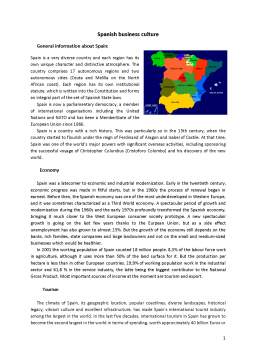Extras din referat
Spain is a very diverse country and each region has its own unique character and distinctive atmosphere. The country comprises 17 autonomous regions and two autonomous cities (Ceuta and Melilla on the North African coast). Each region has its own institutional statute, which is written into the Constitution and forms an integral part of the set of Spanish State laws.
Spain is now a parliamentary democracy, a member of international organisations including the United Nations and NATO and has been a MemberState of the European Union since 1986.
Spain is a country with a rich history. This was particularly so in the 15th century, when the country started to flourish under the reign of Ferdinand of Aragon and Isabel of Castile. At that time, Spain was one of the world’s major powers with significant overseas activities, including sponsoring the successful voyage of Christopher Columbus (Cristoforo Colombo) and his discovery of the new world.
Economy
Spain was a latecomer to economic and industrial modernization. Early in the twentieth century, economic progress was made in fitful starts, but in the 1960s the process of renewal began in earnest. Before then, the Spanish economy was one of the most underdeveloped in Western Europe, and it was sometimes characterized as a Third World economy. A spectacular period of growth and modernization during the 1960s and the early 1970s profoundly transformed the Spanish economy, bringing it much closer to the West European consumer society prototype. A new spectaculair growth is going on the last few years thanks to the Eurpean Union, but as a side effect unemployment has also grown to almost 25%. But the growth of the economy still depends on the banks, rich families, state companies and large landowners and not on the small and medium-sized businesses which would be healthier.
In 2001 the working population of Spain counted 18 million people. 8,3% of the labour force work in agriculture, although it uses more than 50% of the land surface for it. But the production per hectare is less than in other European countries. 29,9% of working population work in the industrial sector and 61,8 % in the service industry, the latte being the biggest contributor to the National Gross Product. Most important sources of income at the moment are tourism and export.
Tourism
The climate of Spain, its geographic location, popular coastlines, diverse landscapes, historical legacy, vibrant culture and excellent infrastructure, has made Spain's international tourist industry among the largest in the world. In the last five decades, international tourism in Spain has grown to become the second largest in the world in terms of spending, worth approximately 40 billion Euros or about 5% of GDP in 2006. The most popular areas are the Costa Brava, Costa del Maresme, Costa Dorada in the east and Costa del Sol in the south of Spain.
Regional languages figuring prominently in a number of territories:
• Aranese, co-official in Catalonia. It is spoken mainly in the Pyrenean comarca of the Aran Valley (Val d'Aran), in north-westernCatalonia. It is a variety of Gascon, which in turn is a variety of the Occitan language.
• Basque, co-official in the Basque Country and northern Navarre (see Basque and mixed zones). Basque is the only non-Romance language with an official status in mainland Spain.
• Catalan, co-official in Catalonia, the Balearic Islands and, as a distinct variant (Valencian), in the Valencian Community. It is recognised—but not official—in Aragon (La Franja). Furthermore, it is also spoken without official recognition in the municipality of Carche, Murcia.
• Galician, co-official in Galicia. It is also spoken without official recognition in the adjacent western parts of the Principality of Asturias and Castile and León.
Preview document
Conținut arhivă zip
- Business Culture in Spain.docx






















